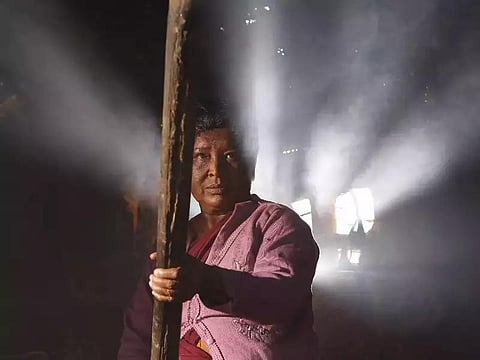

From the legendary ‘pazham’ comedy in Karakattakaran to becoming the cornerstone for horror-comedy films after a career-defining role in the Muni franchise, Kovai Sarala has come a long way since her first major role in Mundhanai Mudichu (1983). For such a seasoned actor, with hundreds of films and several awards under her belt, it’s a surprise to hear her share her lack of confidence in doing a serious role—like the one in Prabhu Solomon’s latest film, Sembi, which features her in the lead as well.
Excerpts:
Despite being a comedian, your role in films like Viralukketha Veekkam, Koodi Vazhnthal Kodi Nanmai and Kandha Kadamba Kathir Vela contained many serious portions as well. How would a film like Sembi compare to them?
Even when I do comedy, I’m usually serious, perhaps thrashing someone so you can get a good laugh from it. Sirika vekkurathu oru periya bakkiyam. I consider it god’s gift to me. Though I have always wanted to play a serious role that would be integral to a film, I never got it. So, when Prabu Solomon sir came to me with an interesting role, I agreed even though the character is an elderly woman (laughs). I wasn’t sure whether I could pull off this role though. In fact, the story didn’t allow me to sleep for two months. Though I’m used to enjoying freedom in performance, here, I told sir that I would be a doll who would replicate his actions.
As an actor so reliant on improvisations and last-minute changes, was it unusual to do a role that’s as well-defined?
It’s as different as kindergarten and college. For this film, I felt like a PhD student (smiles). When the director explained the role to me, it felt like I had wasted a lot of time in the industry. In my comedy films, I had to come up with 10 types of laughter and 15 types of crying. Here, I had to do just what the director wanted. The first few days were tough. Something was wrong, and we realised it was my wig. When I pulled it out, my natural hair looked different, and Prabu Solomon sir said he wanted that. He asked if I could get it dyed and I agreed. Every time my natural style of acting, developed over decades, surfaced, he would control it. From day three, though I would ask for another take, sir was often satisfied with what I had done (laughs).
The film features you in difficult terrains, having you climb trees and traversing through the virgin forests for Sembi.
I wasn’t prepared for the tree scene at all. I had to sit on a tree branch for four hours overlooking a 1,500 ft drop. There was no point in having safety precautions because if someone falls down from such height, you can’t even find the body. I believe that my acting instructions come from the Almighty, and I don’t have the right to question that. Despite all my efforts, some even asked me whether it was VFX and that hurt me a bit. Right from this scene to carrying Raghava Lawrence master on my hip in the Kanchana films, everything I do is real.
As someone who has been in the industry for so long, did you ever want to stop doing certain roles that stereotyped you?
I don’t think I can say no to films. Veetla summa okandhu soru aaki dhaan saapudanum (laughs). I have always desired different roles. I even wanted to dance to duet songs. Evan kudukkuraan? Films like Sembi are opportunities that rarely come by, and I couldn’t afford to miss them. Such films happening are a big deal and I hope to see more of them in the future. For that, we must also do good work. Otherwise, guys in the audience will text their friends, ‘Indha padam mokka macha, vanthudatha’ (laughs).
After actors like Manorama and yourself, it appears that there are no real successors.
That’s because they don’t write roles for women comedians anymore. When Aachi amma was working, such writing existed, but the number went down when I was working. Thankfully, I got directors who gave me good characters predominantly from the lower-middle-class strata. I would notice such people on the roads, and I would absorb their style. That, I believe, is the reason for the success of my roles. After me, many talented actors have come into the industry. But it has taken me all these years to get my own film like Sembi and that’s why you’re interviewing me now (laughs).
I feel sad that the directors who were there for me—Rama Narayanan, V Sekhar, Kamal Haasan sir and Lawrence master—aren’t with me now. The roles they wrote felt custom-made for me. Male comedians, for all these years, have had their own team or writers. But women like us couldn’t do that. We couldn’t afford to employ four-five writers. We made do with whatever we got and tried to pull off something unique. Films like Shah Jahan happened like that.
What are your views on comedy in Tamil cinema today?
Today’s audience has changed; people seem happy with comedy that works in the moment and don’t seem to mind that they don’t stand the test of time. I think it comes back to the lack of writers. Nagaichuvaikum sirippukum inniku panjam. Laughter is an emotion that doubles as medicine for us. We have forgotten that and that’s why diseases like Covid have become rampant.
This year marks your 40th year in the industry...
Has it been 40 years already? Such a number gives away my age, I think (laughs). In my second film, I played the role of a 60-year-old woman when I was barely 18. Given that it’s been 40 years, my age as an artist is now 100. I guess such a number deserves more respect (laughs).